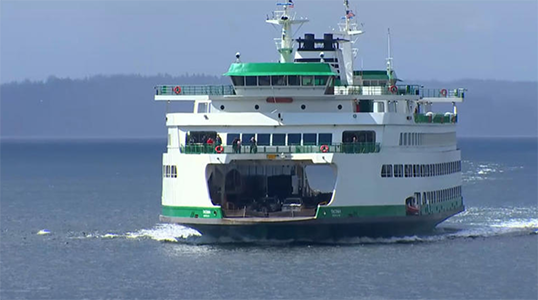||| FROM KOMO-TV SEATTLE |||
The Washington State Ferries system has been plagued with the same problems for years aging boats, staff shortages, and low employee morale.
But it does have a fairly new director, so has he been able to affect any change? Steve Nevey assumed that role in March, so now, with just about five months under his belt there, KOMO News asked him how he would rate his performance so far.
“Yeah, it’s been interesting,” he said. “I think we’ve done a lot of good things, and we’re starting to position ourselves to be, you know, resilient for the future.”
While ferry riders and others who live near ferry terminals may have a lot of priorities, KOMO News asked Nevey what his are.
“I think there are two number one priorities, which is building new boats and fixing our staffing issues,” Nevey told KOMO News in a one-on-one interview. The state opened bidding for two new boats, but those bids won’t come in until later this year.
Charles Prestrud, transportation analyst at the Washington Policy Center and former state transportation and ferries employee, is critical of the timeline.
“But these hybrid electric ferries, the new ones they’re hoping to have built, that decision was made in 2018, and they won’t enter service until 2028,” Prestrud told KOMO News. That means six years of the process has already passed.
“So, clearly, the process has been problematic, and that has a lot to do with why we don’t have enough ferries and why service has been reduced and will continue to be reduced for several years to come,” said Prestrud, who is also critical of the system for being in the staffing shortage it’s in right now.
“They already knew in 2019 that they were facing a wave of retirements. A lot of senior employees who either would soon be eligible for retirement or already were eligible for retirement,” said Prestrud.
Nevey told KOMO News that he helped start a new program to get people trained up to Captain several years ago when he first joined WSF as the director of operations. That Puget Sound Pilotage program will help get deck officers trained up and certified.
“There are numerous exams that you have to take from Friday Harbor down to Tacoma,” said Ferry Captain Russell Fee. It’s about two dozen exams and a whole lot of study time.
“They didn’t get paid to do it. But now we relieve them from work for six to nine months, and it’s their full-time job to go and get that credentialed,” Nevey explained.
This is one thing that he told KOMO News is helping improve morale.
**If you are reading theOrcasonian for free, thank your fellow islanders. If you would like to support theOrcasonian CLICK HERE to set your modestly-priced, voluntary subscription. Otherwise, no worries; we’re happy to share with you.**








WSF’s will not explain how crew shortages and cancelled ferries because of crewing are happening so much more frequently than in the past. They have 21 Puget Sound ferries … essentially the same they have had for years with seven new vessels added 2010-2018 and older vessels retired. Their last staffing report (which they have now allegedly stopped making public) showed qualified 1,074 ferry crew with a full target staffing of 1,148. Qualified on board crew divided by 21 ferries is 51 crew per vessel, but they are only operation 15 vessels this summer. Some crew members (specifically engineering room) remain with vessels in rehab, overhaul, or new propulsion system installation i.e., (one ferry in electrical conversion). So what happens with the masters, mates, and deck crews of the four ferries that are not operating this summer? The Calumet incident gives the public a clue … they had two crews aboard the ferry. Ferry crews sign up for a route, and when WSF doesn’t run a ferry on that route (think Vashon, Bremerton, and Port Townsend routes) … those non-operating ferry crews have to get paid.
Bottom line is WSF can’t explain crew shortages when they are operating at the less than 80% of normal summer operations. It might be location of where the crew members live where that don’t want to commute to a different route … and that’s a legitimate issue. But to repetitively repeat they are short crew members when crew staffing data indicates there isn’t a shortage requires a better explanation from Mr. Nevey.